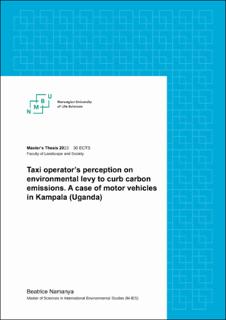| dc.description.abstract | Climate change and other environmental problems are frequently attributed to social problems and a lack of collective action. The national environmental law was amended in Uganda, and a new environmental tax clause was added to cut down on emissions from old cars and other sources. Studies show that every day, some 50,000 vehicles enter the city, most of them are taxis. These vehicles, which are largely reconditioned or used, have poor fuel efficiency, and emit a lot of exhaust fumes into the air, contributing significantly to the poor air quality in different cities of the country. Effective policy implementation requires a detailed understanding of the operators’ perception of pollution and environmental concerns to reduce emissions. This is essential for the efficient implementation of the tax policy and the enactment of new policies in the future to safeguard the environment and reduce pollution. In this sense, this study aims to contribute to the understanding of taxi operators’ perceptions of the environmental levies on reconditioned vehicles as a measure to curb emissions in Uganda, using Kampala as a case study. First, the review of academic literature was conducted to comprehend the relationship between environmental levy and taxi operators. Secondly, one focus group discussion (FGD), Ten (10) key informants, and one hundred (100) interview questionnaires were distributed to taxi operators in Kampala city, to gather field data for the analysis of their perception. And in this case, 69% of the taxi operators surveyed felt that reconditioned vehicles pollute the environment; and 76% of respondents (Taxi operators) attribute vehicle pollution to the release of dangerous gasses. In fact, most taxi operators (95%) are aware of the damage of pollution from reconditioned vehicles or automobiles. However, 62% of the taxi operators oppose a fee on the environmental levy, and other 59% respondents oppose a ban on reconditioned vehicles as emission-controlling measures. They also highlighted two main reasons why the Kampala taxi operators (sector) do not consider purchasing new vehicles; one was the high prices and two was poor roads/high maintenance. Reducing taxes on new vehicles for it will give a choice to those who can afford to pay willingly, and renovating road in the city to enhance mass transit systems like BRT and light rail are necessary if the city is to reduce emissions from the use of reconditioned taxis. | |
